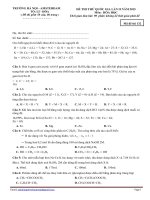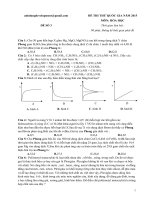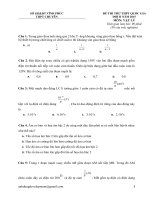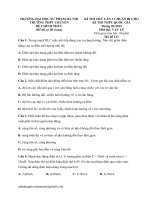- Trang chủ >>
- Cao đẳng - Đại học >>
- Luật
Đề thi thử thpt quốc gia 2021 môn Anh số 26
Bạn đang xem bản rút gọn của tài liệu. Xem và tải ngay bản đầy đủ của tài liệu tại đây (124.34 KB, 8 trang )
<span class='text_page_counter'>(1)</span>ĐỀ THI THỬ THPTQG MÔN TIẾNG ANH NĂM 2021 CÓ ĐÁP ÁN Mark the letter A, B, C, or D on your answer sheet to indicate the word whose underlined part differs from the other three in pronunciation in each of the following questions. Question 1. A. visited B. destroyed. C. believed. D. listened. Question 2. A. kind. C. time. D. mile. B. milk. Mark the letter A, B, C, or D on your answer sheet to indicate the word that differs from the other three in the position of primary stress in each of the following questions. Question 3. A. correct B. provide. C. produce. D. offer. Question 4. A. miserable B. decisive. C. beautiful. D. national. Mark the letter A, B, C, or D on your answer sheet to indicate the correct answer to each of the following questions. Question 5. You didn't go to school yesterday, ________? A. do you. B. were you. C. did you. D. are you. Question 6: Highway 15 ______ yesterday due to a serious road accident by the local authority. A. was closed. B. closes. C. has closed. D. was closing. Question 7: There is a map_____________ the wall just above the teacher’s desk. A. from. B. on. C. before. D. in front of. Question 8. ______ he waited, the more impatient he became. A. Longer. B. Longest. C. The longer. D. The longest. Question 9. At first sight I met her, I was impressed with her____________ eyes. A. big round beautiful B. beautiful round big C. round beautiful big D. beautiful big round Question 10. Harry ______ a song when Jane came in. A. sings. B. sang. C. was singing. D. is singing. Question 11. _____rain or snow, there are always more than fifty thousand fans at the football games. A. Even though. B. Because. C. Despite. D. Because of. Question 12. He will take the children for a work to a nearby playground__________ ..
<span class='text_page_counter'>(2)</span> A. before he finished dinner. B. as soon as he finishes dinner. C. while he was having dinner. D. after he had eaten dinner. Question 13. ______ his presentation, he was very glad as the attendees applauded yesterday. A. Carefully prepared. B. Having carefully prepared. C. Was carefully prepared. D. Carefully preparing. Question 14. Everyone can help the needy by making a ______ to a charity organisation. A. donate. B. donation. C. donative. D. donating. Question 15. They ______ a big fortune when they were young, so they didn’t have to work hard. A. came into. B. took up. C. looked for. D. took after. Question 16. I think that _______ responsibility for human life shouldn’t only be doctors’duty. A. doing. B. rushing. C. joining. D. taking. Question 17. My uncle left his job because he did not have _____ of promotion. A. visions. B. prospects. C. scenarios. D. posts. Question 18. English is an obligatory subject from sixth grade across Vietnam, but in large cities, many primary schools demand high _________. A. capacity. B. experience. C. competency. D. ability. Question 19. I can say in all _______that I knew nothing of these plans. A. trust. B. sincerity. C. loyalty. D. faith. Mark the letter A, B, C, or D on your answer sheet to indicate the word(s) CLOSEST in meaning to the underlined word(s) in each of the following questions. Question 20. This organization was formed to do the mission of the preservation of biological diversity, sustainable use of natural resources, and the reduction of pollution and wasteful consumption. A. contamination. B. energy. C. extinction. D. development. Question 21. School uniform is mandatory in most of Vietnamese schools. A. divided. B. depended. C. compulsory. D. paid. Mark the letter A, B, C, or D on your answer sheet to indicate the word(s) OPPOSITE in meaning to the underlined word(s) in each of the following questions. Question 22. In Western culture, it is polite to maintain eye contact during conversation..
<span class='text_page_counter'>(3)</span> A. discourteous. B. insecure. C. informal. D. irresponsible. Question 23. : She grabbed it firmly, got to her feet and walked past him with her nose in the air. A. proudly. B. hastily. C. arrogantly. D. modestly. Mark the letter A, B, C, or D on your answer sheet to indicate the sentence that best completes each of the following exchanges. Question 24. Jane is talking to Mary to her hair . - Jane: “ What an attractive hair style you have got, Mary!” - Mary : “__________________ “ A. You are telling a lie. B. I don’t like your saying C. Thank you very much. I’m afraid. D. Thank you for your compliment.. Question 25. Maria and Alex are talking about the environment. - Maria: “Our environment is getting more and more polluted. Do you think so?” - Alex: “_________ It’s really worrying. ” A. I’ll think about that. C. I can’t agree with you more B. I don’t agree. D. I don’t think so.. Read the following passage and mark the letter A, B, C, or D on your answer sheet to indicate the correct word or phrase that best fits each of the numbered blanks from 26 to 30. Linda lives alone in London, with her wonderful collection. She has been collecting all the royal mementoes since 1960 when she saw the wedding of Princess Margaret on TV. The first things she bought were a disk with the Queen’s head in the centre, and a few Coronation mugs to go with it. And now she has a huge (26)_____ of things: pictures, paintings, ashtrays, hundreds of mugs, tea-pots, tea-cloths, biscuit tins, posters, books, flags, toast racks, egg cups, candle sticks and so on. In fact, she has over four thousand Royal souvenirs. It (27)_____ all her spare time to keep everything clean and dusted. She is often playing around, making a special area for one of the Royals. It keeps her amused for hours, and the visitors (28)____ come, mainly foreign visitors, never get tired of talking about her Royal family. It is not always easy for Linda to collect the things she really wants. Once she was in a shop and the shop keeper was drinking his tea from a lovely Coronation mug. She offered to buy it from him (29)_____ he was not interested. So she went out to a shop nearby and.
<span class='text_page_counter'>(4)</span> bought a very expensive mug and exchanged it for his Coronation mug. She just wanted to put the mug in its (30)_____ home. Question 26: A. catergory B. kind. C. sort. D. range. Question 27: A. makes B. takes. C. gets. D. spends. Question 28: A. who. B. whom. C. which. D. whose. Question 29: A. and. B. yet. C. so. D. but. C. true. D. real. Question 30: A. proper B. correct. Read the following passage and mark the letter A, B, c, or D on your answer sheet to indicate the correct answer to each of the questions from 31 to 35. When we meet people for the first time, we often make decisions about them based entirely on how they look. And of course, we too are being judged on our appearance. Undoubtedly, it’s what’s inside that’s important but sometimes we can send out the wrong signals and so get a negative reaction, simply by wearing inappropriate clothing. When selecting your clothes each day, it is therefore important to think about who you’re likely to meet, where you are going to be spending most of your time and what tasks you are likely to perform. Clearly, on a practical level, some outfits will be more appropriate to different sorts of activity and this will dictate your choice to an extent. However, there’s no need to abandon your individual taste completely. After all, if you dress to please somebody else’s idea of what looks good, you may end up feeling uncomfortable and not quite yourself. Some colours bring your natural colouring to life and others can give you a washed-out appearance. Try out new ones by all means, but remember that dressing in bright colours when you really like subtle neutral tones or vice versa will make you feel self-conscious and uncomfortable. You know deep down where your own taste boundaries lie. It may be fun to cross these sometimes, but do take care not to go too far all at once. Reappraising your image isn’t selfish because everyone who comes into contact with you will benefit. You’ll look better and you’ll feel a better person all round. And if in doubt, you only need to read Professor Albert Mehrabian’s book Silent Messages, which showed that the impact we make on each other depends 55 percent on how we look and behave, 38 percent on how we speak, and only seven percent on what we actually say. Question 31: Which could be the best title for the passage? A. Choosing Appropriate Business Suits B. Making Judgements about People’s Appearance.
<span class='text_page_counter'>(5)</span> C. Making Your Image Work for You D. Creating a Professional Image Question 32: The word “undoubtedly” in paragraph 1 is closest in meaning to _______. A. doubtfully.. B. unquestionably. C. uncertainly.. D. deniably.. Question 33: According to paragraph 1, people can get a negative reaction from others by _______. A. talking about other people’s behaviours.. B. sending out right signals.. C. wearing inappropriate clothes.. D. expressing too strong emotions.. Question 34: Which of the following is NOT mentioned in paragraph 2 as a factor to be considered when choosing clothes? A. Places you spend time in.. B. Other people’s views on beauty.. C. Kinds of tasks you perform.. D. People you meet.. Question 35: The word “others” in paragraph 3 refers to _______. A. neutral tones.. B. taste boundaries.. C. colours.. D. means.. Read the following passage and mark the letter A, B, c, or D on your answer sheet to indicate the correct answer to each of the questions from 36 to 42. We are descendents of the ice age. Periods of glaciations have spanned the whole of human existence for the past 2 million years. The rapid melting of the continental glaciers at the end of the last ice age spurred one of the most dramatic climate changes in the history of the planet. During this interglacial time, people were caught up in a cataclysm of human accomplishment, including the development of agriculture and animal husbandry. Over the past few thousand years, the Earth’s climate has been extraordinarily beneficial, and humans have prospered exceedingly well under a benign atmosphere. Ice ages have dramatically affected life on Earth almost from the very beginning. It is even possible that life itself significantly changed the climate. All living organisms pull carbon dioxide out of the atmosphere and eventually store it in sedimentary rocks within the Earth’s crust. If too much carbon dioxide is lost, too much heat escapes out into the atmosphere. This can cause the Earth to cool enough for glacial ice to spread across the land. In general the reduction of the level of carbon dioxide in the atmosphere has been equalized by the input of carbon dioxide from such events as volcanic eruptions. Man, however, is upsetting the equation by burning fossil fuels and destroying tropical rain forests, both of which release stored carbon dioxide. This energizes the greenhouse effect and causes the.
<span class='text_page_counter'>(6)</span> Earth to warm. If the warming is significant enough, the polar ice caps eventually melt. The polar ice caps drive the atmospheric and oceanic circulation systems. Should the ice caps melt, warm tropical waters could circle the globe and make this a very warm, inhospitable planet. Over the past century, the global sea level has apparently risen upwards of 6 inches, mainly because of the melting of glacial ice. If present warming trends continue, the seas could rise as much as 6 feet by the next century. This could flood coastal cities and fertile river deltas, where half the human population lives. Delicate wetlands, where many marine species breed, also would be reclaimed by the sea. In addition, more frequent and severe storms would batter coastal areas, adding to the disaster of the higher seas. The continued melting of the great ice sheets in polar regions could cause massive amounts of ice to crash into the ocean. This would further raise the sea level and release more ice, which could more than double the area of sea ice and increase correspondingly the amount of sunlight reflected back into space. The cycle would then be complete as this could cause global temperatures to drop enough to initiate another ice age. Question 36. What is the main topic of the passage? A. The possibility that the popular ice caps will melt. B. Man’s effect on the carbon dioxide level in the atmosphere. C. The climate of the Earth over the years. D. The coming of another ice age. Question 37. According to the passage, carbon dioxide is stored in each of the following EXCEPT______. A. sedimentary rocks. B. polar ice caps. C. rain forests. D. fossil fuel. Question 38. According to the passage, what is the relationship between carbon dioxide and the Earth’s climate? A. Carbon dioxide, which is trapped in glacial ice, is released when warm temperatures cause the ice melt. B. An increase in atmospheric carbon dioxide results in the warming of the climate. C. The greenhouse effect, which leads to the warming of the climate, is result of too much carbon stored in the Earth’s crust. D. Rain causes carbon dioxide to be washed out of the atmosphere and into the ocean. Question 39. The word "beneficial" in the first paragraph is closest in meaning to______..
<span class='text_page_counter'>(7)</span> A. calm. B. inviting. C. thoughtful. D. favorable. Question 40. It can be inferred from the passage that the development of agriculture______. A. preceded the development of animal husbandry. B. withstood vast changes in the Earth’s climate. C. did not take place during an ice age. D. was unaffected by the greenhouse effect. Question 41. The word “this” in the third paragraph refers to______. A. man’s upsetting the equation. B. the melting of the polar ice caps. C. a volcanic eruption D. the reduction of the level of carbon dioxide. Question 42. The word “inhospitable” in the fourth paragraph is closest in meaning to______. A. imperfect. B. uninhabitable. C. unlikable. D. cruel. Mark the letter A, B, C, or D on your answer sheet to indicate the underlined part that needs correction in each of the following questions. Question 43. Everybody in my house had to do their share of household chores when we are at home. A. Everybody. B. had to. C. their share. D.. household. chores Question 44. So far this term, the students have learned how to express his ideas in writing a thesis statement. A. this. B. have learned. C. his. D. writing. Question 45. Our principal is that everyone has to join hands to do the housework. A. principal. B. has to. C. hands. D. do. Mark the letter A, B, C, or D on your answer sheet to indicate the sentence that is closest in meaning to each of the following questions. Question 46: My parents last took us to our home village two years ago. A. My parents didn’t take us to our home village two years ago. B. My parents have taken us to our home village for two years. C. My parents haven’t taken us to our home village for two years. D. My parents took us to our home village in two years. Question 47. "You should finish these assignments before this weekend. " the teacher said. A. The teacher warned us against finishing those assignments before that weekend.
<span class='text_page_counter'>(8)</span> B. The teacher congratulated us on finishing those assignments before that weekend C. The teacher advised us to finish those assignments before that weekend D. The teacher ordered us to finish those assignments before that weekend Question 48: Children are not allowed to play football in the streets. A. Children may play football in the streets. B. Children mustn’t play football in the streets. C. Children should play football in the streets. D. Children needn’t play football in the streets. Mark the letter A, B, C, or D on your answer sheet to indicate the sentence that best combines each pair of sentences in the following questions. Question 49. He helped us a lot with the project. We couldn’t continue without him. A. Provided his contribution wouldn’t come, we couldn’t continue with the project. B. But for his contribution, we couldn’t have continued with the project. C. Unless we had his contribution, we could continue with the project. D. If he had contributed positively, we couldn’t have continued with the project. Question 50. We arrived at the cinema. Then we realized our tickets were still at home. A. No sooner had we realized that our tickets were still at home than we arrived at the cinema. B. Not until we arrived at the cinema that we realized that our tickets were still at home C. Only after we arrived at the cinema did we realize that our tickets were at home. D. Hardly had we arrived at the cinema than we realized that our tickets were still at home. ĐÁP ÁN 1 - A; 2 - B; 3 - D; 4 - B; 5 - C; 6 - A; 7 - B; 8 - C; 9 - D; 10 - C; 11 - C; 12 - B; 13 - B; 14 - B; 15 - A; 16 - D; 17 - B; 18 - C; 19 - B; 20 - A; 21 - C; 22 - A; 23 - D; 24 - D; 25 - C; 26 - D; 27 - A; 28 -A; 29 - D; 30 - A; 31 - C; 32 - B; 33 - C; 34 - B; 35 - C; 36 - A; 37 - B; 38 - B; 39 - D; 40 - C; 41 - A; 42 - B; 43 - B; 44 - C; 45 - A; 46 - C; 47 - C; 48 - B: 49 - B; 50 - C; Mời các bạn tham khảo các bài tiếp theo tại: quoc-gia.
<span class='text_page_counter'>(9)</span>









